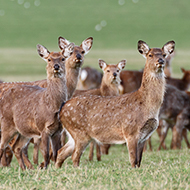
Findings have 'major implications' for the control of TB.
New research from Trinity College Dublin suggests that increasing populations of sika deer in Ireland may be linked to local outbreaks of TB infection in cattle.
The research – published in Frontiers in Veterinary Science – found that, despite a decrease in TB infection rates in recent decades, there is a correlation between rising sika populations and higher local TB infections.
Dr David Kelly, first author of the journal article, said: “Irish farmers have been aware of the effects of bovine TB for well over 70 years. Its incidence has steadily diminished in Ireland, from 3 per cent in 1960 to 0.3 per cent some 50 years later.
“In the mid-1980s it became clear European badgers were a TB wildlife host. Since then, badger populations have been controlled around farms with TB outbreaks whenever those outbreaks cannot be linked to cattle.
“In recent years, however, it has become clear that controlling TB in badger populations cannot rely on culling alone. Along with this change in thinking, there has been a steady shift away from culling and towards badger vaccination.
“Unfortunately, while the management of one TB wildlife host has made great advances, another wildlife TB host has appeared on the radar: deer.”
Studies in Europe and the USA have shown that deer, at higher densities, can sustain TB in their herds. This new research has aligned with these findings, identifying certain populations of sika deer as maintenance hosts of TB in Ireland.
Dr Kelly concluded: “Now, when attempting to manage TB in wildlife, sika deer will need to be considered as well as badgers. Our analyses suggest Sika deer are currently of greatest concern in County Wicklow but if numbers continue to rise in other counties they may also pose problems elsewhere.”



 HMRC has invited feedback to its communications regarding the employment status of locum vets and vet nurses.
HMRC has invited feedback to its communications regarding the employment status of locum vets and vet nurses.